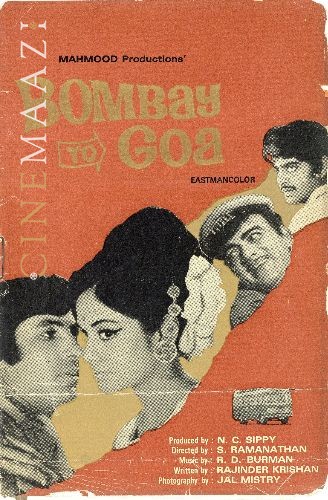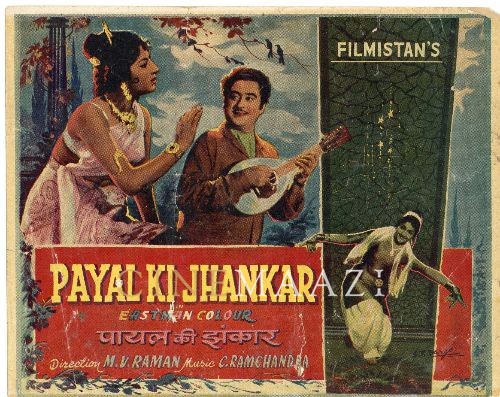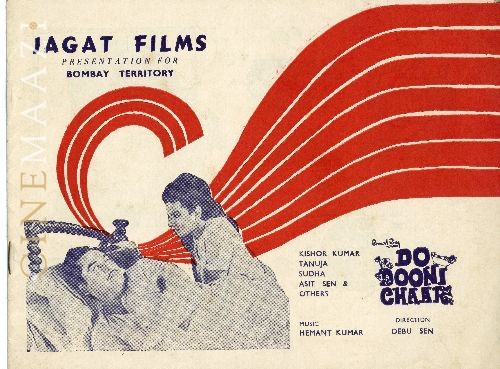Kishore Kumar

Subscribe to read full article
This section is for paid subscribers only. Our subscription is only $37/- for one full year.
You get unlimited access to all paid section and features on the website with this subscription.
Not ready for a full subscription?
You can access this article for $2 , and have it saved to your account for one year.
- Real Name: Abhas Kumar Ganguly
- Born: 4 August 1929 (Khandwa, British India)
- Died: 13 October 1987 (Bombay)
- Primary Cinema: Hindi
- Parents: Gouri Devi and Kunjalal Ganguly
- Spouse: Ruma Devi (divorced), Madhubala (died), Yogeeta Bali (divorced), Leena Chandavarkar
- Children: Amit Kumar, Sumit Kumar
One of the most successful playback singers of Hindi cinema, the iconic Kishore Kumar started his career as a chorus singer with Bombay Talkies in 1946. Many decades later, he continues to be a listeners’ favourite, with fans old and young from across the world accessing his music on the internet. His rise to the top of India’s cache of playback singers was nothing short of extraordinary. A skilled imitator, interpreter, and innovator, he is renowned for his expressive, versatile singing voice. He provided playback for the Hindi film screen’s leading actors over the course of a career spanning nearly four decades. In addition to being a composer and director, he was also known for his comic roles onscreen in the 1950s. Despite not having undergone formal training in classical music, he was renowned for his effortless skill as a singer, to which he added various timbral effects such as yodelling, as well as the use of atypical instruments and upbeat rhythms. One of the most prolific singers in the Indian popular music industry, he sang songs in Bengali, Marathi, Assamese, Gujarati, Kannada, Bhojpuri, Malayalam, Odia, and Urdu besides Hindi. He won no less than eight Filmfare awards for best male playback singer, namely for Roop tera mastana (Aradhana, 1969), Dil aisa kisi ne mera (Amanush, 1975), Khaike paan banaras wala (Don, 1978), Hazaar raahen mudke dekheen (Thodisi Bewafaii, 1980), Pag ghungroo baandh (Namak Halaal, 1982), Agar tum na hote (Agar Tum Na Hote, 1983), Manzilein apni jagah hain (Sharaabi, 1984), and Saagar kinaare (Saagar, 1985).
Born Abhas Kumar Ganguly on 4 August, 1929 in Khandwa, he was the youngest child of a Bengali professional family that had settled in what is the present-day state of Madhya Pradesh. Story goes that, as a child growing up in Khandwa, he met with an accident and injured his toe. The injury kept him crying for a month, which supposedly greatly improved his voice. Narrating this incident, elder brother Ashok Kumar opined that Kumar would not have become a singer if not for that toe-knock!
As a teenager, he landed a job as an occasional chorus singer with the Bombay Talkies film studio, in Bombay. His elder brother Ashok Kumar was a reigning star here at the time. Kishore Kumar made his debut onscreen acting in the film Shikari (1946). The film failed to create waves. Kumar’s tryst with the limelight began with the success of Andolan (1951). The film earned him stardom as a singer-actor, helping him carve his own path separate from that of his older brother, Ashok Kumar.
Despite his brother Ashok Kumar being keen on Kishore pursuing a career in singing, Kishore himself was more interested in being a singer. He wanted to sing like his idol, K L Saigal, though he did not manage to impress the big names of the industry. It was Salil Chowdhury who heard Kumar’s voice and gave him his first success, assigning him the song Chhota sa ghar hoga in Naukari (1954). Kumar had made his formal debut in singing with the song Marne ki duayen kaun kare from Ziddi (1949), which had music by Khemchand Prakash. It was music director S D Burman who can be credited with honing Kishore’s talent. Hearing Kumar imitate Saigal, Burman was impressed even as he advised him to develop a style of his own.
Kishore Kumar acted mainly in slapstick comedies in his early years. His talent for comedic roles as well as singing won him attention and applause. Featuring in Bimal Roy’s Naukri (1954) and Hrishikesh Mukherjee’s directorial debut, Musafir (1957), he peaked as a comic actor with New Delhi (1956). Directed by Mohan Segal, the film saw Kumar play a North Indian Punjabi masquerading as a South Indian Tamilian in order to be able to rent a room in New Delhi. Another major highlight of his career as a singer-actor was his self-produced film, Chalti Ka Naam Gaadi (1958). Directed by Satyen Bose, it starred the three Kumar brothers—Ashok, Anoop Kumar, and Kishore. The film revolves around a middle-aged man who resents women due to certain misunderstandings, and thus forbids his younger brothers from marrying.
Being an unschooled singer with no classical training, Kumar was not initially sought after by the top music composers of the day. Yet, due to the power of his voice—its sheer cool modernity, evoking joy and energy—he carved his own niche, and reached the top. Kumar was known for his enormous versatility and spontaneity. His skill in interpretation and innovation saw him shine like no other. Kumar made an extraordinary ascent to the top of the cream of Hindi cinema’s playback singers. Known for his vivid timbral effects such as yodelling, he also experimented with the electric organ and other atypical accompaniments. His performances were further enlivened with buoyant rhythms. These features combined to give a feel of modernity to Kumar’s overall sound as a singer.
In his innings in playback singing, Kishore Kumar collaborated with top actor of the times, Dev Anand, becoming his singing voice onscreen in the late 1940s. The versatile Kumar went on to render playback primarily for the romantic star Dev Anand for the next two decades. This partnership resulted in a treasure of musical hits in films like Munimji (1955), Funtoosh (1956), Nau Do Gyarah (1957), and Jewel Thief (1967). The trio of S D Burman, Dev Anand and Kishore Kumar gave some of the most memorable songs of the era. In the late 1960s, a new era started for Kumar after he rendered playback for Rajesh Khanna in Aradhana (1969). He thereafter became the playback voice of the new superstar. Part of the powerful quartet comprising R D Burman, Anand Bakshi, Rajesh Khanna and himself, his singing became further varied and multi-hued. It incorporated shades of pain, romance, vivacity and even a rare emotional energy. In time, Kumar became the voice of the reigning superstar Amitabh Bachchan over hits such as Amar Akbar Anthony (1977), Don (1978), Muqaddar Ka Sikandar (1978), Kasme Vaade (1978), and Sholay (1975). Highly popular with the youth, Kumar went on to reign supreme. He became the go-to singer for every emotion, and every occasion. Kishore Kumar thus took top position as the leading playback singer of the Hindi film industry; a rank he retained until he passed away.
He rendered his first duet with Lata Mangeshkar in Ziddi (1948) and with Asha Bhosle in Muqaddar (1950).
Kumar’s spontaneity on the microphone was remarkable. His buffoonery as he renders Eena meena deeka in Aasha (1957) is hilarious, as is his rendering of the duet Aake seedhi lagi, singing both the male and female version, and also playing a woman for the film Half Ticket (1962) featuring Pran and himself. His unselfconscious abandon is also there to see in his music teacher act in Padosan (1968). His ‘comic hero’ antics pre-date Amitabh Bachchan, as seen in Kumar’s Naughty Boy (1962) opposite Nutan. Among his many popular songs are Zindagi ek safar, Yeh jo mohabbat hai, Chingari koi bhadke, Mere dil mein aaj, Gaadi bula rahi hai, Mera jeevan kora kagaz, Main pyaasa tum, O manjhi re, Aap ke anurodh, O saathi re, Hum bewafa harghiz, Ek rasta hai zindagi, Om shanti om, Hame tumse pyar, Chhookar mere mann ko, Shayad meri shaadi, De de pyar de, Inteha ho gayi, and Log kehete hai.
Kishore Kumar was known as much for his brilliance as for his eccentricities off screen as well. He was known to record or act only once he was assured by his manager that the payment had been received. On one occasion, on discovering that his dues had not been fully paid, he appeared on set with makeup applied to only one side of his face! It was his way of pointing out that he would be in full make-up only after his dues were cleared in full. In another instance, he would arrive at producer R C Talwar’s residence every morning, shouting, “Hey Talwar, de de mere aath hazaar" (Hey Talwar, give me my eight thousand) till the producer finally clear his dues. On one occasion, a producer went to court to get a decree to the effect that Kumar would faithfully follow the director’s orders. While shooting a car sequence, Kumar apparently refused to alight from his vehicle till the director ordered him to do so. Filming a car scene in Bombay, Kumar drove on till he reached Khandala all because the director had forgotten to say “cut”!
As a music director, he composed music for films such as Jhumroo (1961), Door Gagan Ki Chhaon Mein (1964), Hum Do Daku (1967), Door Ka Rahi (1971), Zameen Aasmaan (1972), Badhti Ka Naam Dadhi (1974), Shabaash Daddy (1978), Chalti Ka Naam Zindagi (1981) and Door Wadiyon Mein Kahin (1982) which was the last movie he directed.
Making his debut in film direction, he also directed several productions such as Door Gagan Ki Chhaon Mein (1964), Hum Do Daku (1967), Door Ka Rahi (1971), Badhti Ka Naam Daadi (1974), Shabaash Daddy (1978), Chalti Ka Naam Zindagi (1982), and Door Wadiyon Mein Kahin (1982), which was the last film he directed. Interestingly, as a filmmaker, he veered towards serious topics and tragedy. This was in sharp contrast to his image as a singer, actor and composer who was known for his cheery, jovial fare.
Winner of eight Filmfare awards in the best male playback singer category, he was also awarded the Lata Mangeshkar award by the Madhya Pradesh government. The MP government also initiated a new award called the Kishore Kumar award for contributions to Hindi cinema.
On the personal front, he was married four times. His was first married to Bengali singer and actor Ruma Guha Thakurta between 1950 and 1958. Kumar’s second marriage was to reigning diva Madhubala. They were married from 1960 until her death in 1969—she suffered from ventricular septal defect (hole in the heart). Kumar wed Yogeeta Bali in 1976; the couple divorced two years later. His last marriage was to Leena Chandavarkar. The couple had a son – Sumit Kumar. Kishore Kumar also had a son with first wife Ruma – Amit Kumar.
Kishore Kumar passed away on 13 October, 1987 following a heart attack in Bombay. It was his brother Ashok's 76th birthday that day. In his memory, the government of Madhya Pradesh set up a memorial on the outskirts of his native town of Khandwa. Open to the public, the centre holds his life-sized statue, as well as a mini-theatre and museum dedicated to him. A commemorative stamp was also released in his honour.
References
https://www.britannica.com/biography/Kishore-Kumar
https://timesofindia.indiatimes.com/topic/Kishore-Kumar
https://indianexpress.com/about/kishore-kumar/
Ateet Ke Sitare by Nand Kishore
-
Filmography (57)
SortRole
-
Love In Bombay 1975
-

Badhti Ka Naam Dadhi 1974
-

Pyar Diwana 1972
-

Bombay To Goa 1972
-
Hungama 1971
-
Door Ka Raahi 1971
-

Aansoo Aur Muskan 1970
-

Payal Ki Jhankar 1968
-

Do Dooni Chaar 1968
-

Haye Mera Dil 1968
-

Shrimanji 1968
-

Duniya Nachegi 1967
-








.jpg)



